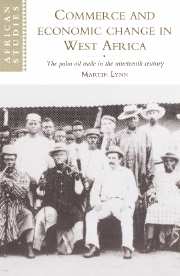Book contents
- Frontmatter
- Contents
- List of maps
- List of tables
- Preface
- List of abbreviations
- Introduction
- Part I The development of the palm oil trade in the first half of the nineteenth century
- Part II The restructuring of the palm products trade in the second half of the nineteenth century
- Conclusion
- Notes
- Select bibliography
- Index
- Other books in the series
Introduction
Published online by Cambridge University Press: 04 December 2009
- Frontmatter
- Contents
- List of maps
- List of tables
- Preface
- List of abbreviations
- Introduction
- Part I The development of the palm oil trade in the first half of the nineteenth century
- Part II The restructuring of the palm products trade in the second half of the nineteenth century
- Conclusion
- Notes
- Select bibliography
- Index
- Other books in the series
Summary
‘This palm oil is of great use to the inhabitants [of Guinea] in several respects’, wrote John Barbot in the seventeenth century, ‘for besides its serving to season their meat, fish, etc., and to burn in their lamps to light them at night, it is an excellent ointment against rheumatick pains, winds and colds in the limbs, or other like diseases.’ It is, he added, ‘no despicable sauce, especially when new’. The palm oil that Barbot eulogised is derived from the fruit of the oil palm, elaeis guineensis. The nuts produced by the oil palm contain a fleshy outer pericarp, from which palm oil is produced, and an inner kernel from which palm kernel oil is derived. The latter is a colourless, translucent oil, similar to coconut oil, while palm oil itself is a bright orange-yellow colour, with an odour often compared to violets; on exposure to air the oil turns white, thickens, and over time its odour becomes rancid.
Elaeis guineensis was classified by Nicolaas Jacquin in 1763. While it can now be found in many parts of the world besides West Africa, most notably South-East Asia and South America, it is clearly of African origin. Fossil pollen similar to the pollen of the oil palm has been identified in Miocene layers in the Niger Delta, while archaeological evidence suggests palm oil was known to and traded by third-millennium Egyptians. Conversely, the South American palm is clearly from the post-Columbian era. Linguistic evidence shows that the names used for the oil palm in South America are derived from West African origins. Further, pre-Columbian European travellers to West Africa found the oil palm common.
- Type
- Chapter
- Information
- Commerce and Economic Change in West AfricaThe Palm Oil Trade in the Nineteenth Century, pp. 1 - 8Publisher: Cambridge University PressPrint publication year: 1997



